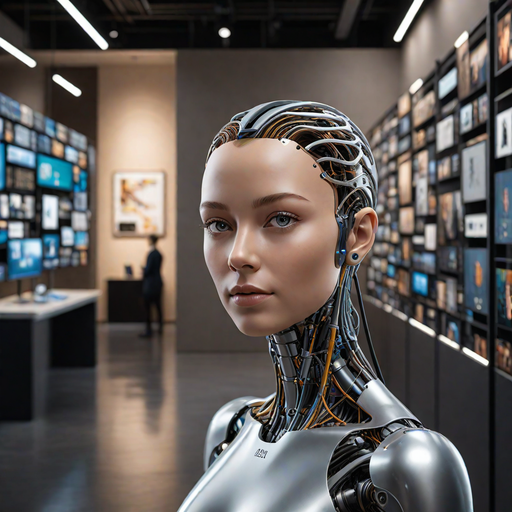The Future of Artificial Intelligence Beyond 2024, delves into the evolving landscape of Artificial Intelligence, and its implications for society and the economy. It explores trends, technological advancements, ethical considerations, and societal impacts by highlighting the transformative potential of Artificial Intelligence and the need for responsible innovation in shaping our collective future.
Future of work and society with Artificial Intelligence
The future of work and society with Artificial Intelligence is a complex and evolving landscape that presents opportunities and challenges. Overall, the future of work and society with AI will likely be characterized by rapid technological advancement, changes in work, and the need for proactive policies and societal responses to ensure that the benefits of AI are equitably distributed and ethical considerations are carefully addressed.
- Automation and Job Displacement
AI and Automation may reshape job roles, but it also creates new opportunities in areas that require human creativity, emotional intelligence, and complex problem-solving skills.
- Skill requirements
The rise of AI requires workers to adapt and acquire new skills to remain competitive in the job market. Skills like digital literacy and adaptability become crucial.
- Ethical and Social Implications
The widespread adoption of AI raises important ethical and social questions regarding privacy, bias, accountability, and the equitable distribution of benefits. Ethical concerns, including prejudice and privacy, need careful attention.
- Collaboration Between Humans and AI
Collaboration between humans and AI is pivotal, as AI augments rather than replaces human capabilities.
- Remote Work and Digital Transformation
AI technologies drive digital transformation across industries, enabling remote work, personalized customer experiences, and more efficient business operations. This shift towards digitalization is likely to continue, with AI playing a central role in shaping the future of work.
- Education and Lifelong Learning
As the job market evolves, there is an increasing need for continuous education and lifelong learning to adapt to changing skill requirements. Educational institutions and employers must collaborate to provide opportunities for up-skilling and reskilling workers.
- Social Safety Nets
Some experts advocate for policies such as universal basic income (UBI) to address the potential job displacement caused by automation. These policies ensure that all citizens can access basic financial security regardless of employment status.
Artificial Intelligence Trends in 2024

The 2024 AI trends guide offers insights for policymakers, industry leaders, researchers, and stakeholders on AI’s latest developments, applications, and societal impact. It aims to maximize benefits while minimizing risks and challenges in the complex AI landscape.
Here’s a brief overview of what each section could entail:
- Advancements in Deep Learning
Focuses on the ongoing evolution of deep learning techniques, and architectures and driving progress in AI applications such as computer vision, natural language processing, and reinforcement learning.
- The Rise of Edge AI and Distributed Intelligence
Highlights the emergence of Edge AI, where AI computations are performed locally on devices rather than in centralized data centres, enabling real-time processing and decision-making at the network edge.
- AI for Social Good
Exploration of how AI can address societal challenges and promote sustainable development goals, such as healthcare accessibility, environmental sustainability, and equitable access to education and opportunity.
- AI Ethics
Explore ethical considerations surrounding AI development and deployment, including issues related to algorithmic bias, data privacy, and the societal implications of automation and job displacement.
- AI and Cyber security
Examine the role of AI in enhancing cyber security defences and the potential risks posed by the malicious use of AI for cyber-attacks and misinformation campaigns.
- The Future of Work
Considers the implications of AI and automation on the future of employment, including opportunities for job augmentation, skills development, and workforce adaptation in the face of technological change.
- Human-AI Collaboration
Investigate how humans and AI systems can collaborate synergistically to enhance productivity, creativity, and decision-making across various domains.
Artificial Intelligence Advancement beyond 2024
Beyond 2024, Artificial Intelligence will see advancements in GAI, neuromorphic computing, explainable AI, Brain-Computer Interfaces, quantum computing, robotics, creativity, and societal challenges, characterized by innovation, ethical considerations, and AI integration into society, economy, and everyday life.
- Generalized AI
AI systems excel in specific tasks, aiming for human-like cognitive abilities and adaptability across various domains.
- Neuromorphic Computing
A technique inspired by the human brain’s structure aims to create efficient, low-power neural networks in AI systems.
- Explainable and Trustworthy AI
As AI systems become more prevalent in critical decision-making, the focus is on making AI algorithms transparent, trustworthy, and understandable.
- AI and Brain-Computer Interfaces (BCIs)
Advancements in BCIs could facilitate direct communication between the human brain and AI systems, enhancing human augmentation, providing immersive experiences, and enabling assistive technologies.
- AI in Robotics and Autonomous Systems
AI-powered robotics and autonomous systems are expected to advance in various industries with applications ranging from self-driving vehicles to robotic assistants.
- AI and Quantum Computing
Integration of AI and quantum computing holds the potential for enhancing optimization and introducing novel machine learning algorithms.
- Continual Learning and Lifelong AI
AI systems that continuously learn and adapt will become increasingly crucial.
- AI in Creativity and Art
AI’s role in creative fields like art, music, literature, and design is set to grow.
- AI Governance and Regulation
The development of governance frameworks, regulations, and ethical guidelines for AI is strengthened.
- AI and Global Challenges
AI will be crucial in addressing global challenges such as climate change, healthcare disparities, poverty, and education inequality.
- AI-Powered Assistants and Chabot’s
Future advancements in Natural language processing and conversational AI will enhance their intelligence and nuance.
- AI Democratization
Efforts to democratize AI, making it more accessible to individuals and organizations with diverse backgrounds and skill levels, may continue to accelerate.
Conclusion
“Beyond 2024: The Future of Artificial Intelligence” offers a glimpse into a future where AI continues to evolve and shape every aspect of our lives. It emphasizes the importance of ethical considerations, responsible governance, and human-AI collaboration in harnessing AI’s transformative potential for humanity’s benefit. As we journey into this future, we must remain vigilant, proactive, and inclusive to ensure AI advances benefit humanity and foster a more equitable and sustainable world.
